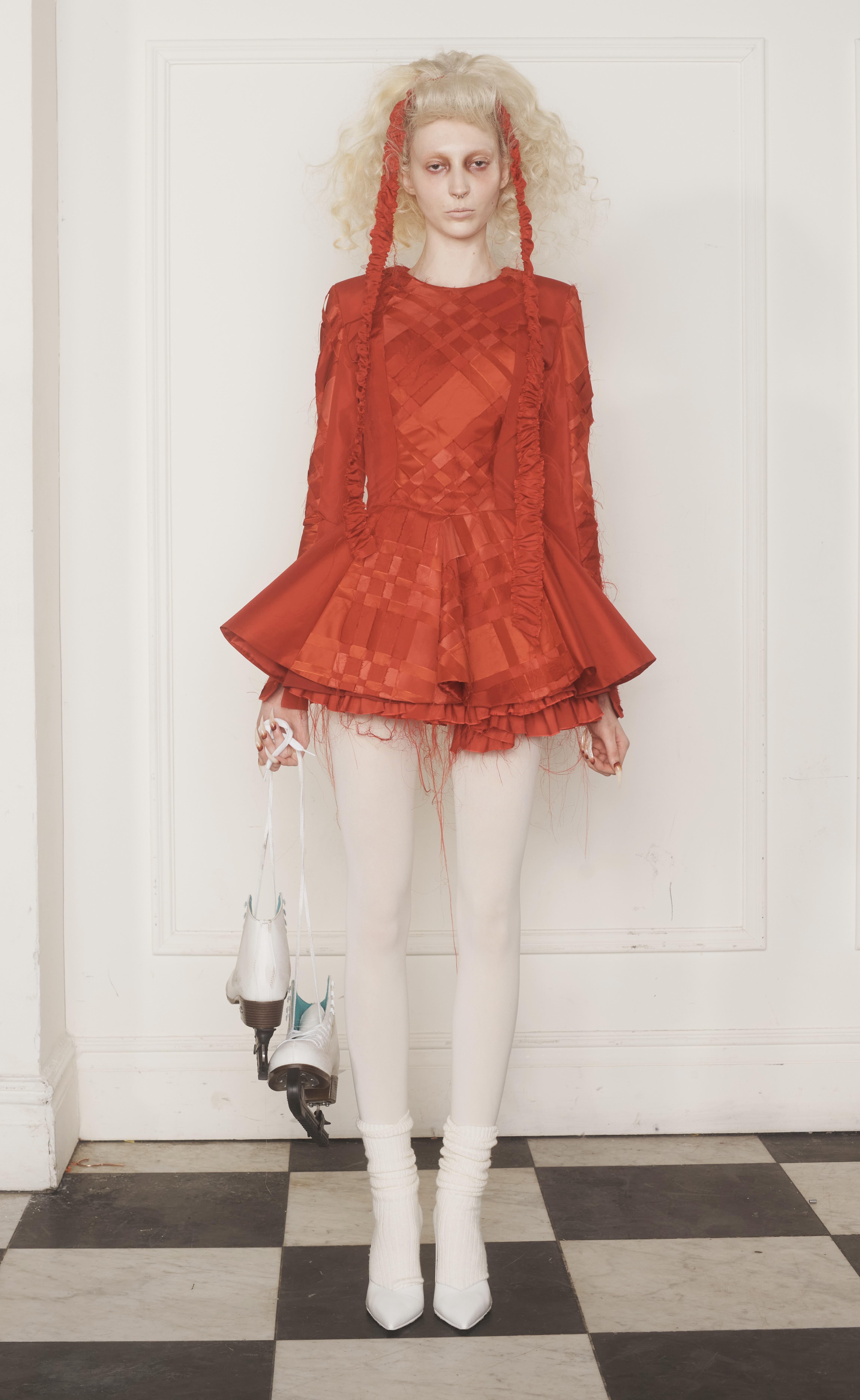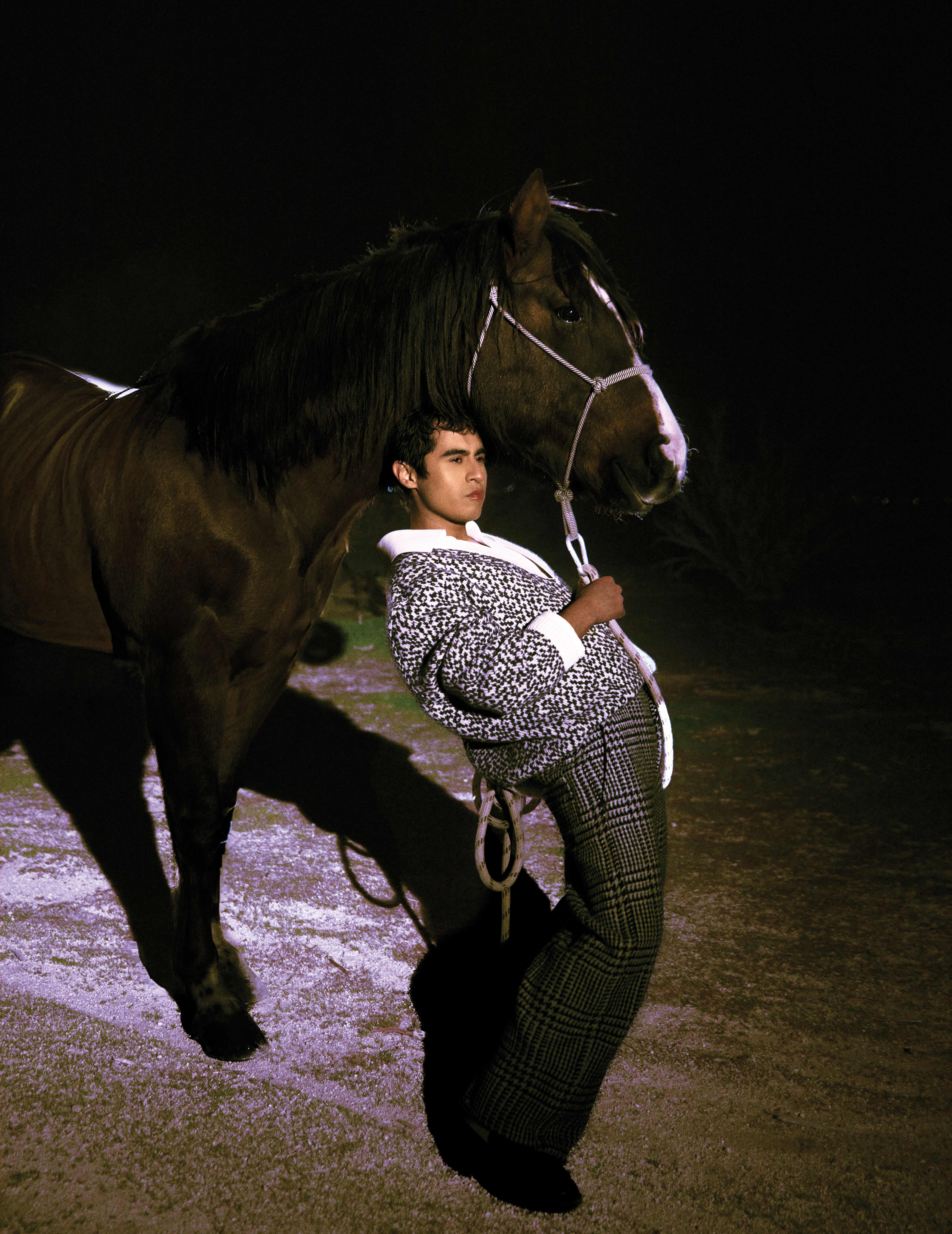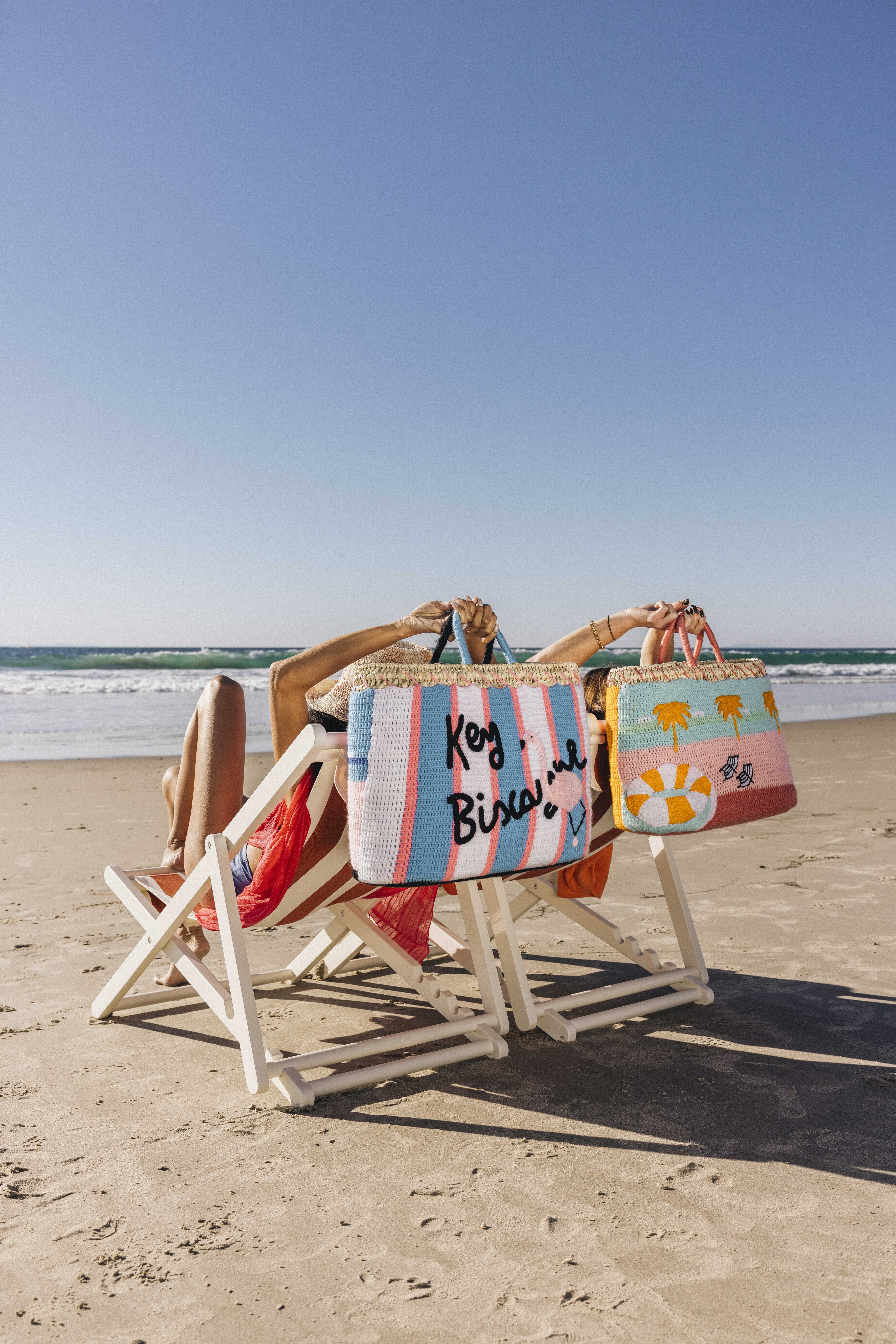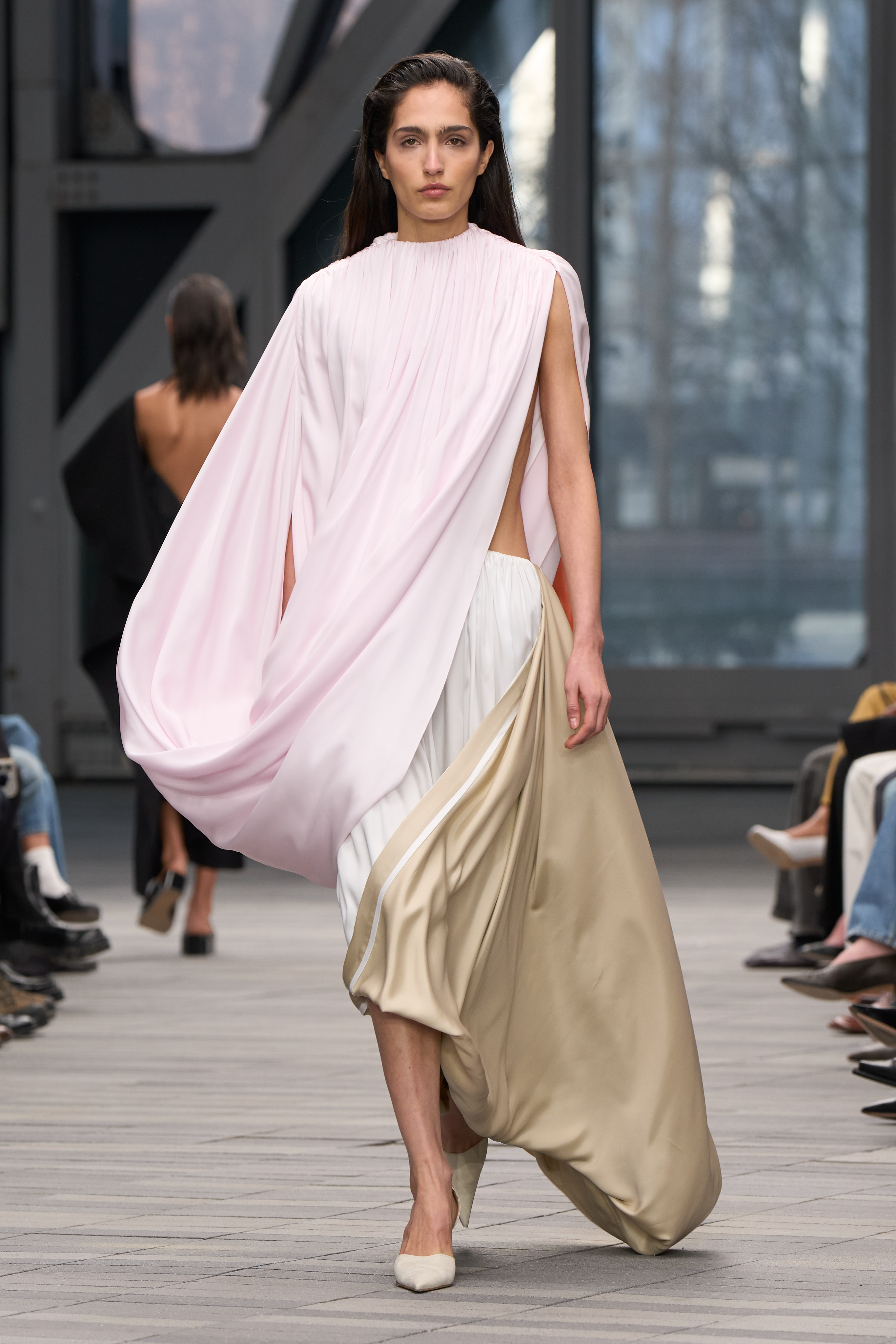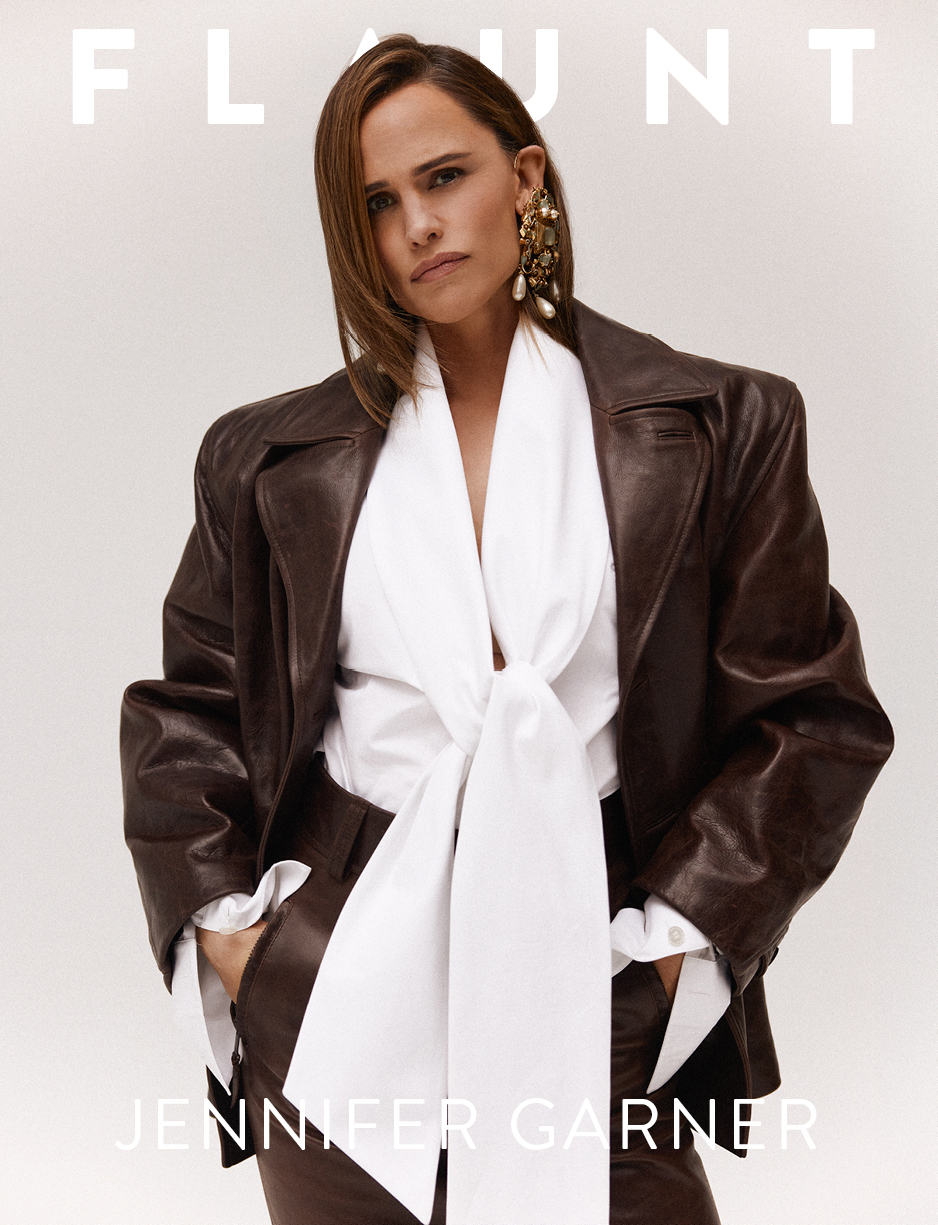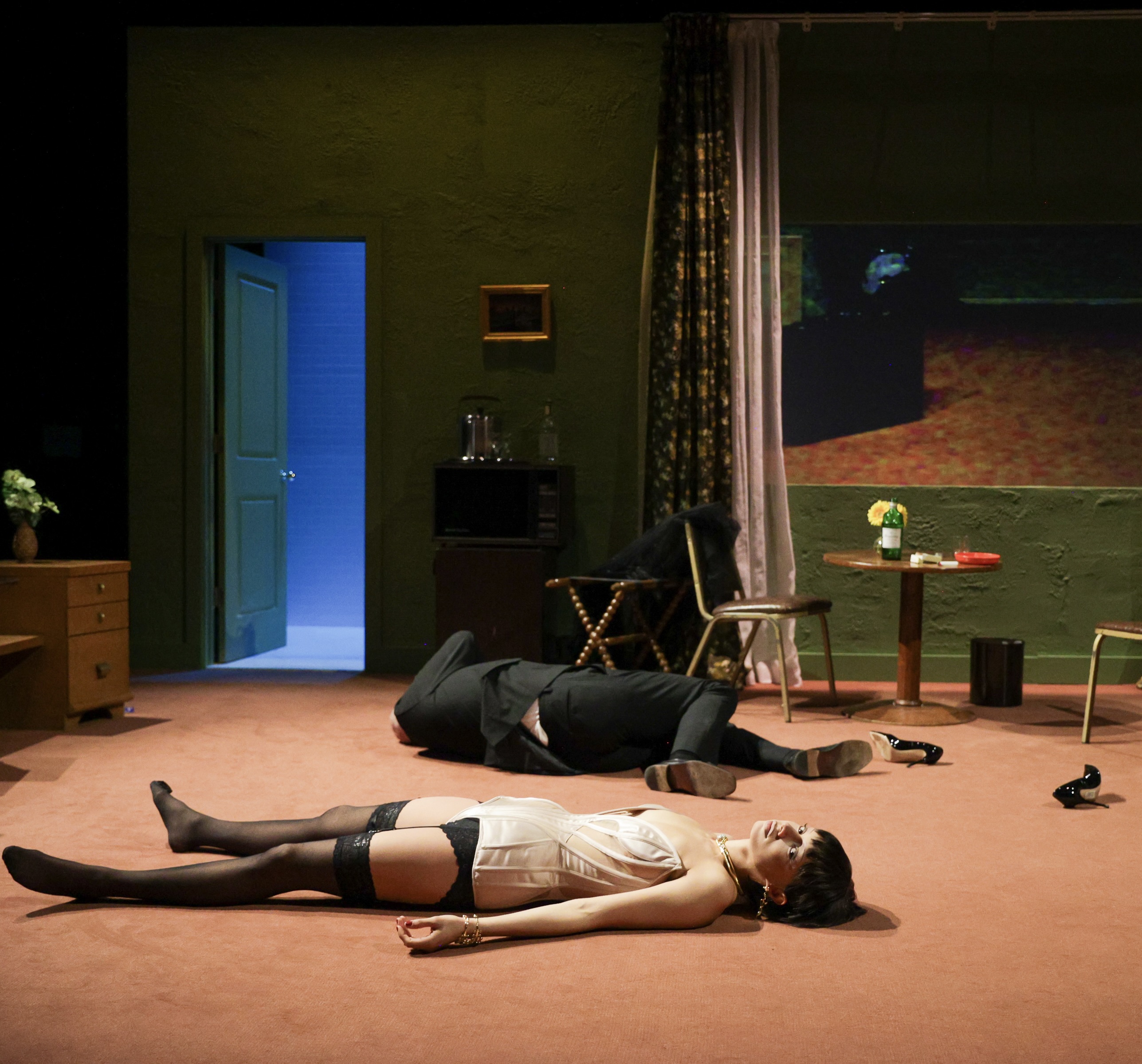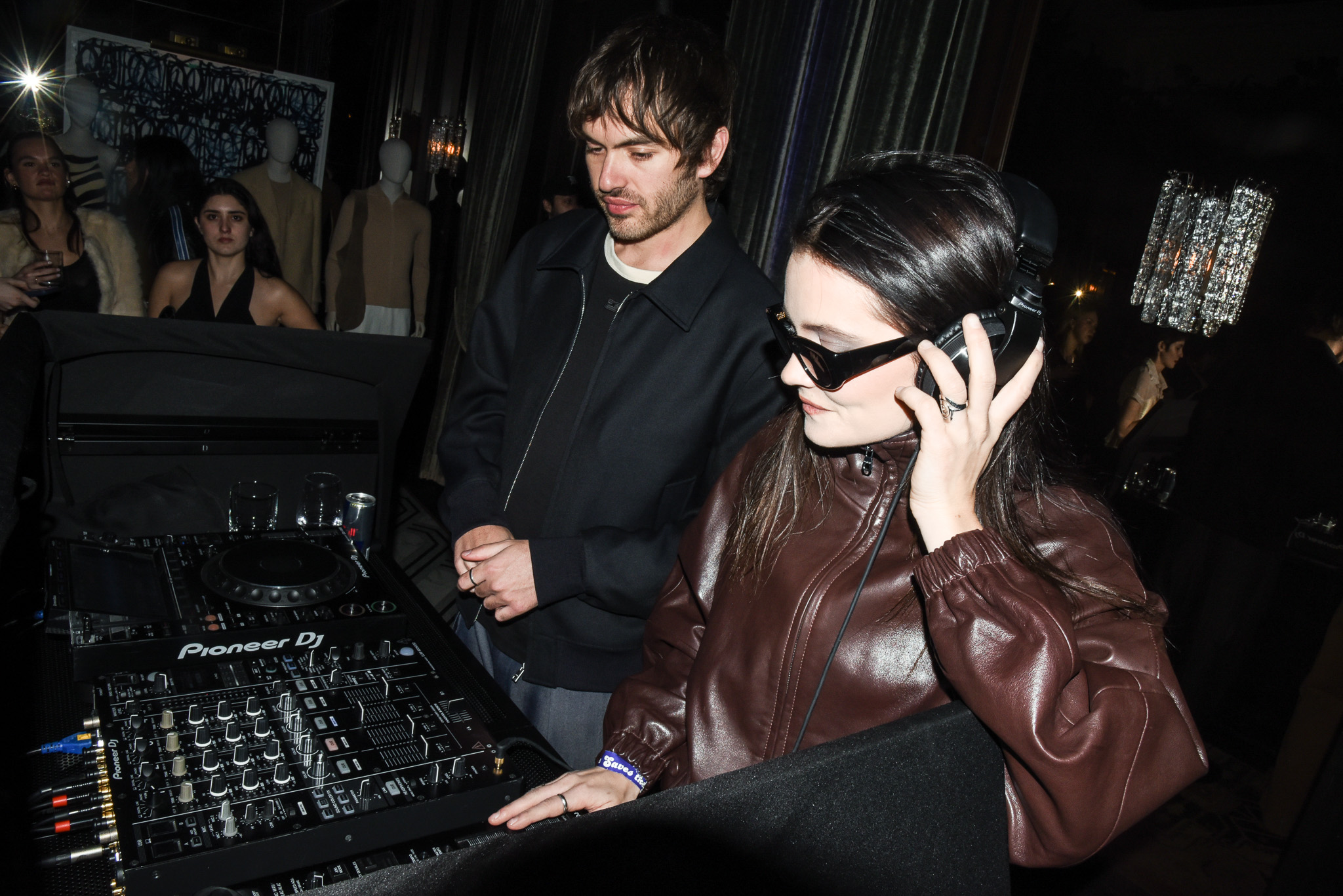Throughout the last several years, British indie-pop act [The Japanese House](https://www.instagram.com/thejapanesehouse/) has made strides in the global music scene. The artist, also known as Amber Bain, weaves indie pop styles with electro synths and soft, soothing vocals. Through vulnerable, straight-to-the-point lyrics, she shares stories of her relationships, self-discovery and life in a very open way — one of the many reasons she’s captured audiences on an international scale.
Since the beginning of her music career, Bain’s songs have remained unwaveringly “real,” in part a result of her intimate, complex connection with both her music and her own emotions. In a world that is so often dominated by chaos and fallacy, her down-to-earth tones provide a necessary relief — especially for young people.


Photography and Design by [Devin Kasparian](https://www.instagram.com/devin.pdf/?hl=en)
In September, Bain released “Something Has To Change,” a lighthearted, poppy single about the very-relatable concept of being stuck in a routine and needing something to change. This was her first release since her debut album, “Good at Falling,” came out in March. The album features songs like “Marika is Sleeping,” “Everybody Hates Me,” and “Maybe You’re the Reason” among others.
We caught up with Amber Bain just before her show at The Haunt in Ithaca, New York, one of the many stops on her U.S. tour. Just as the venue doors opened, we filed into her tour bus — a fitting spot for a mid-tour interview. We lounged on the couch while she stretched out in a recliner (she says it’s one of her favorite spots on the bus). We chatted about strange Italian restaurants and the best waterfalls in Ithaca before diving into the real juicy content: fan culture, the idea of authenticity, and her very rational fear that someone will get ahold of her phone notes.
**Brontë Cook: How’s the tour going so far?**
**Amber Bain:** The tour has been never ending, in my head. This is our third American tour within a year, which is quite a lot, I think. Obviously America is so big, and to be honest I really prefer touring America anywhere else because you get a little more variety. But yeah, even though it's been fun, I'm definitely very tired. I kind of want to stop touring mainly just because I want to finish the next album, which is what I’m working on now. The first thing to release will be an EP. The name of the EP will be called “Something Has to Change,” which is the song I just released. It’ll be four tracks, and the next song from it will be released quite soon. I think that after that it’ll be an album, pretty much as soon as possible.
**Devin Kasparian: Congratulations on “Something Has to Change,” I really love it! I also love the music video — as someone who loves visuals, I was like, yes. Love the laundry pile.**
**AB:** Thank you! Yeah, It was surprisingly very hot in there. Well, not surprisingly. But there was a lot of fleece. I was like, “Guys! I’m going to pass out! We need to get this shot done!” I was covered in sweat. I actually had to take my clothes off underneath because it was too hot to be in there in any more layers. But it was worth it! I like the one with my dog in it the best.
**BC: One of my favorite things about your music is that it's so authentic and raw. I'm sure that you get that a lot, but today's music industry is so dominated by charts and ratings. How do you keep your authenticity when you’re surrounded by a culture that prioritizes superficial things?**
**AB:** I think that's really the only real way I know how to write music. I don't really go like, “Right, I'm gonna get real with people,” or “I'm gonna really let loose and get my feelings out there.” I guess it's like a therapeutic thing. Well, in some ways therapeutic, and in some ways emotionally torturous to write your feelings out. … the meaning of that is totally subjective, so how could something to be inauthentic? What does that really mean? Yeah, but I guess being honest in my lyrics is probably my natural way of writing right now, rather than before when it was quite metaphorical and abstract. Now it’s sort of to the point of like, “Oh! I’m sad. Everyone’s leaving me!”
**DK: Is it challenging releasing music that you've had such an emotional connection to while you're writing it, and sharing it out to a giant audience?**
**AB:** Not really. I think the most challenging part is the initial part. As someone who's not very good at accepting my emotions about certain things, a lot of the time I'll come to confront them when I write them down. So that's kind of the hard part. After that, I don't really think about the release of the song. I think maybe the first two songs I was like, “Oooh, I wonder how…” but now after it's released, I sort of let it go. Because we can't control it in any way, how people perceive it, so I just try my best to ignore it. Which obviously doesn't work, and I do spend hours searching comments. But I try not to focus on it. I really try to do that. Apart from if someone comments that my drummer looks like Bill Murray, then I’ll spend a lot of time thinking about that. The really… groundbreaking comments.
**BC: Music is your emotional release, and now you’re touring the U.S. putting it out into the world all the time — it’s your job. How do you find a balance between doing what you’re passionate about and not overworking yourself?**
**AB:** I think that's still a thing that one is constantly trying to configure, the balance between touring and writing. I'm starting to think for me, personally, I need a long period of time just writing. I don't think I need to tour this much. I like performing and I really enjoy it, to a degree, but not the point of which I overdo it. Then I'm just gone. You know? So I think I'm still trying to figure out that balance. I don’t know yet. I'll get back to you in a year! If it’s worked out…
**BC: Have you been writing while you’ve been on tour?**
**AB:** No, I’m never alone!
**BC: Wow, what’s that like?**
**AB:** I actually really like not being alone. I way prefer it, and when I get home I’m like… ah, I don’t like it!
**DK: Do you only write when you’re alone?**
**AB:** Yeah, definitely. I can’t write with anyone. I don’t know why… I just need that space. I can’t even have someone in the next room when I’m writing! I can write music, like pieces of music when I’m around other people but not songs. So I’ll just write sort of random clips of music that’ll never be used.
**BC:** **What, generally, is your creative process?**
**AB:** I don't really know. Because when I write a song, my favorite songs that I write, it'll be simultaneous; the chord progression and the lyrics will just happen all at once. But then other times, I'll have a little music idea that I'll be playing around with. Then I'll put lyrics to it or I might have already had those lyrics written in a book somewhere, probably in my notes on my phone. Which is far less romantic, more realistic. If someone ever found my phone notes… I’d be so embarrassed!
**BC: Why?**
**AB:** That would be the end of me! Some of them are just so horribly embarrassing. If I die, that’s one of the things I panic about most. Like, “Oh my God, someone is going to read my phone notes!”
**DK: I'm sure you've interacted with lots of fans, and I know a lot of your fan base really emotionally connects with your music. I think that's a big appeal of yours— I know I cried to your song _f a r a w a y_ while driving in Los Angeles. I've spoken with a lot of other people who've had similar experiences. When you're on these tours with such a deep connection to your music, what is that like, like having all these people who feel connected to you?**
**AB:** It's two things. One, it’s really intense in a way I'm not sure is positive or negative. It's a kind of a crazy existential crisis because you’re like, what? Who am I? You don't walk away knowing if you feel good or bad about the exchange. But then, the other thing is a positive feeling of connection, not dissimilar to the feeling of when you meet someone, a stranger, who happened to grow up in the same town as you. Something that you and this complete stranger have in common. Yeah, it's weird. I haven't been doing the whole “meeting fans after the show” as much this tour as I have done previously. Not because of them, but because it makes me question myself and what I want and what the fuck I’m doing. Like, what am I doing? Why am I in Ithaca, looking at someone’s arm with a tattoo of my head on it, or something?
When I first started, obviously it’s such an ego boost when that happens. When I was 18 or whatever, I was like… “I’m cool!” Then you reach a point, and you’re like, “I don’t deserve this.” It sort of makes you consider everything. The idea of being “a fan” is quite weird. Think about it. Is it right? Is it okay that this young person looks up to me? That's not to say that I don't love it and feel a connection or care for that person, I just question whether fan culture is okay.
The Japanese House U.S. tour continues through November 14. The tour will make stops in U.S. cities across the South and East Coast including East Nashville, Atlanta and Orlando, before heading international. Check all of The Japanese House’s upcoming [tour dates here](https://thejapanesehouse.co.uk/tour).
* * *
Photographed by [Devin Kasparian](https://www.instagram.com/devin.pdf/?hl=en)
Photo assistance by Dylan Comfort
 
Photography and Design by [Devin Kasparian](https://www.instagram.com/devin.pdf/?hl=en)
In September, Bain released “Something Has To Change,” a lighthearted, poppy single about the very-relatable concept of being stuck in a routine and needing something to change. This was her first release since her debut album, “Good at Falling,” came out in March. The album features songs like “Marika is Sleeping,” “Everybody Hates Me,” and “Maybe You’re the Reason” among others.
We caught up with Amber Bain just before her show at The Haunt in Ithaca, New York, one of the many stops on her U.S. tour. Just as the venue doors opened, we filed into her tour bus — a fitting spot for a mid-tour interview. We lounged on the couch while she stretched out in a recliner (she says it’s one of her favorite spots on the bus). We chatted about strange Italian restaurants and the best waterfalls in Ithaca before diving into the real juicy content: fan culture, the idea of authenticity, and her very rational fear that someone will get ahold of her phone notes.
**Brontë Cook: How’s the tour going so far?**
**Amber Bain:** The tour has been never ending, in my head. This is our third American tour within a year, which is quite a lot, I think. Obviously America is so big, and to be honest I really prefer touring America anywhere else because you get a little more variety. But yeah, even though it's been fun, I'm definitely very tired. I kind of want to stop touring mainly just because I want to finish the next album, which is what I’m working on now. The first thing to release will be an EP. The name of the EP will be called “Something Has to Change,” which is the song I just released. It’ll be four tracks, and the next song from it will be released quite soon. I think that after that it’ll be an album, pretty much as soon as possible.
**Devin Kasparian: Congratulations on “Something Has to Change,” I really love it! I also love the music video — as someone who loves visuals, I was like, yes. Love the laundry pile.**
**AB:** Thank you! Yeah, It was surprisingly very hot in there. Well, not surprisingly. But there was a lot of fleece. I was like, “Guys! I’m going to pass out! We need to get this shot done!” I was covered in sweat. I actually had to take my clothes off underneath because it was too hot to be in there in any more layers. But it was worth it! I like the one with my dog in it the best.
**BC: One of my favorite things about your music is that it's so authentic and raw. I'm sure that you get that a lot, but today's music industry is so dominated by charts and ratings. How do you keep your authenticity when you’re surrounded by a culture that prioritizes superficial things?**
**AB:** I think that's really the only real way I know how to write music. I don't really go like, “Right, I'm gonna get real with people,” or “I'm gonna really let loose and get my feelings out there.” I guess it's like a therapeutic thing. Well, in some ways therapeutic, and in some ways emotionally torturous to write your feelings out. … the meaning of that is totally subjective, so how could something to be inauthentic? What does that really mean? Yeah, but I guess being honest in my lyrics is probably my natural way of writing right now, rather than before when it was quite metaphorical and abstract. Now it’s sort of to the point of like, “Oh! I’m sad. Everyone’s leaving me!”
**DK: Is it challenging releasing music that you've had such an emotional connection to while you're writing it, and sharing it out to a giant audience?**
**AB:** Not really. I think the most challenging part is the initial part. As someone who's not very good at accepting my emotions about certain things, a lot of the time I'll come to confront them when I write them down. So that's kind of the hard part. After that, I don't really think about the release of the song. I think maybe the first two songs I was like, “Oooh, I wonder how…” but now after it's released, I sort of let it go. Because we can't control it in any way, how people perceive it, so I just try my best to ignore it. Which obviously doesn't work, and I do spend hours searching comments. But I try not to focus on it. I really try to do that. Apart from if someone comments that my drummer looks like Bill Murray, then I’ll spend a lot of time thinking about that. The really… groundbreaking comments.
**BC: Music is your emotional release, and now you’re touring the U.S. putting it out into the world all the time — it’s your job. How do you find a balance between doing what you’re passionate about and not overworking yourself?**
**AB:** I think that's still a thing that one is constantly trying to configure, the balance between touring and writing. I'm starting to think for me, personally, I need a long period of time just writing. I don't think I need to tour this much. I like performing and I really enjoy it, to a degree, but not the point of which I overdo it. Then I'm just gone. You know? So I think I'm still trying to figure out that balance. I don’t know yet. I'll get back to you in a year! If it’s worked out…
**BC: Have you been writing while you’ve been on tour?**
**AB:** No, I’m never alone!
**BC: Wow, what’s that like?**
**AB:** I actually really like not being alone. I way prefer it, and when I get home I’m like… ah, I don’t like it!
**DK: Do you only write when you’re alone?**
**AB:** Yeah, definitely. I can’t write with anyone. I don’t know why… I just need that space. I can’t even have someone in the next room when I’m writing! I can write music, like pieces of music when I’m around other people but not songs. So I’ll just write sort of random clips of music that’ll never be used.
**BC:** **What, generally, is your creative process?**
**AB:** I don't really know. Because when I write a song, my favorite songs that I write, it'll be simultaneous; the chord progression and the lyrics will just happen all at once. But then other times, I'll have a little music idea that I'll be playing around with. Then I'll put lyrics to it or I might have already had those lyrics written in a book somewhere, probably in my notes on my phone. Which is far less romantic, more realistic. If someone ever found my phone notes… I’d be so embarrassed!
**BC: Why?**
**AB:** That would be the end of me! Some of them are just so horribly embarrassing. If I die, that’s one of the things I panic about most. Like, “Oh my God, someone is going to read my phone notes!”
**DK: I'm sure you've interacted with lots of fans, and I know a lot of your fan base really emotionally connects with your music. I think that's a big appeal of yours— I know I cried to your song _f a r a w a y_ while driving in Los Angeles. I've spoken with a lot of other people who've had similar experiences. When you're on these tours with such a deep connection to your music, what is that like, like having all these people who feel connected to you?**
**AB:** It's two things. One, it’s really intense in a way I'm not sure is positive or negative. It's a kind of a crazy existential crisis because you’re like, what? Who am I? You don't walk away knowing if you feel good or bad about the exchange. But then, the other thing is a positive feeling of connection, not dissimilar to the feeling of when you meet someone, a stranger, who happened to grow up in the same town as you. Something that you and this complete stranger have in common. Yeah, it's weird. I haven't been doing the whole “meeting fans after the show” as much this tour as I have done previously. Not because of them, but because it makes me question myself and what I want and what the fuck I’m doing. Like, what am I doing? Why am I in Ithaca, looking at someone’s arm with a tattoo of my head on it, or something?
When I first started, obviously it’s such an ego boost when that happens. When I was 18 or whatever, I was like… “I’m cool!” Then you reach a point, and you’re like, “I don’t deserve this.” It sort of makes you consider everything. The idea of being “a fan” is quite weird. Think about it. Is it right? Is it okay that this young person looks up to me? That's not to say that I don't love it and feel a connection or care for that person, I just question whether fan culture is okay.
The Japanese House U.S. tour continues through November 14. The tour will make stops in U.S. cities across the South and East Coast including East Nashville, Atlanta and Orlando, before heading international. Check all of The Japanese House’s upcoming [tour dates here](https://thejapanesehouse.co.uk/tour).
* * *
Photographed by [Devin Kasparian](https://www.instagram.com/devin.pdf/?hl=en)
Photo assistance by Dylan Comfort

Photography and Design by [Devin Kasparian](https://www.instagram.com/devin.pdf/?hl=en)
In September, Bain released “Something Has To Change,” a lighthearted, poppy single about the very-relatable concept of being stuck in a routine and needing something to change. This was her first release since her debut album, “Good at Falling,” came out in March. The album features songs like “Marika is Sleeping,” “Everybody Hates Me,” and “Maybe You’re the Reason” among others.
We caught up with Amber Bain just before her show at The Haunt in Ithaca, New York, one of the many stops on her U.S. tour. Just as the venue doors opened, we filed into her tour bus — a fitting spot for a mid-tour interview. We lounged on the couch while she stretched out in a recliner (she says it’s one of her favorite spots on the bus). We chatted about strange Italian restaurants and the best waterfalls in Ithaca before diving into the real juicy content: fan culture, the idea of authenticity, and her very rational fear that someone will get ahold of her phone notes.
**Brontë Cook: How’s the tour going so far?**
**Amber Bain:** The tour has been never ending, in my head. This is our third American tour within a year, which is quite a lot, I think. Obviously America is so big, and to be honest I really prefer touring America anywhere else because you get a little more variety. But yeah, even though it's been fun, I'm definitely very tired. I kind of want to stop touring mainly just because I want to finish the next album, which is what I’m working on now. The first thing to release will be an EP. The name of the EP will be called “Something Has to Change,” which is the song I just released. It’ll be four tracks, and the next song from it will be released quite soon. I think that after that it’ll be an album, pretty much as soon as possible.
**Devin Kasparian: Congratulations on “Something Has to Change,” I really love it! I also love the music video — as someone who loves visuals, I was like, yes. Love the laundry pile.**
**AB:** Thank you! Yeah, It was surprisingly very hot in there. Well, not surprisingly. But there was a lot of fleece. I was like, “Guys! I’m going to pass out! We need to get this shot done!” I was covered in sweat. I actually had to take my clothes off underneath because it was too hot to be in there in any more layers. But it was worth it! I like the one with my dog in it the best.
**BC: One of my favorite things about your music is that it's so authentic and raw. I'm sure that you get that a lot, but today's music industry is so dominated by charts and ratings. How do you keep your authenticity when you’re surrounded by a culture that prioritizes superficial things?**
**AB:** I think that's really the only real way I know how to write music. I don't really go like, “Right, I'm gonna get real with people,” or “I'm gonna really let loose and get my feelings out there.” I guess it's like a therapeutic thing. Well, in some ways therapeutic, and in some ways emotionally torturous to write your feelings out. … the meaning of that is totally subjective, so how could something to be inauthentic? What does that really mean? Yeah, but I guess being honest in my lyrics is probably my natural way of writing right now, rather than before when it was quite metaphorical and abstract. Now it’s sort of to the point of like, “Oh! I’m sad. Everyone’s leaving me!”
**DK: Is it challenging releasing music that you've had such an emotional connection to while you're writing it, and sharing it out to a giant audience?**
**AB:** Not really. I think the most challenging part is the initial part. As someone who's not very good at accepting my emotions about certain things, a lot of the time I'll come to confront them when I write them down. So that's kind of the hard part. After that, I don't really think about the release of the song. I think maybe the first two songs I was like, “Oooh, I wonder how…” but now after it's released, I sort of let it go. Because we can't control it in any way, how people perceive it, so I just try my best to ignore it. Which obviously doesn't work, and I do spend hours searching comments. But I try not to focus on it. I really try to do that. Apart from if someone comments that my drummer looks like Bill Murray, then I’ll spend a lot of time thinking about that. The really… groundbreaking comments.
**BC: Music is your emotional release, and now you’re touring the U.S. putting it out into the world all the time — it’s your job. How do you find a balance between doing what you’re passionate about and not overworking yourself?**
**AB:** I think that's still a thing that one is constantly trying to configure, the balance between touring and writing. I'm starting to think for me, personally, I need a long period of time just writing. I don't think I need to tour this much. I like performing and I really enjoy it, to a degree, but not the point of which I overdo it. Then I'm just gone. You know? So I think I'm still trying to figure out that balance. I don’t know yet. I'll get back to you in a year! If it’s worked out…
**BC: Have you been writing while you’ve been on tour?**
**AB:** No, I’m never alone!
**BC: Wow, what’s that like?**
**AB:** I actually really like not being alone. I way prefer it, and when I get home I’m like… ah, I don’t like it!
**DK: Do you only write when you’re alone?**
**AB:** Yeah, definitely. I can’t write with anyone. I don’t know why… I just need that space. I can’t even have someone in the next room when I’m writing! I can write music, like pieces of music when I’m around other people but not songs. So I’ll just write sort of random clips of music that’ll never be used.
**BC:** **What, generally, is your creative process?**
**AB:** I don't really know. Because when I write a song, my favorite songs that I write, it'll be simultaneous; the chord progression and the lyrics will just happen all at once. But then other times, I'll have a little music idea that I'll be playing around with. Then I'll put lyrics to it or I might have already had those lyrics written in a book somewhere, probably in my notes on my phone. Which is far less romantic, more realistic. If someone ever found my phone notes… I’d be so embarrassed!
**BC: Why?**
**AB:** That would be the end of me! Some of them are just so horribly embarrassing. If I die, that’s one of the things I panic about most. Like, “Oh my God, someone is going to read my phone notes!”
**DK: I'm sure you've interacted with lots of fans, and I know a lot of your fan base really emotionally connects with your music. I think that's a big appeal of yours— I know I cried to your song _f a r a w a y_ while driving in Los Angeles. I've spoken with a lot of other people who've had similar experiences. When you're on these tours with such a deep connection to your music, what is that like, like having all these people who feel connected to you?**
**AB:** It's two things. One, it’s really intense in a way I'm not sure is positive or negative. It's a kind of a crazy existential crisis because you’re like, what? Who am I? You don't walk away knowing if you feel good or bad about the exchange. But then, the other thing is a positive feeling of connection, not dissimilar to the feeling of when you meet someone, a stranger, who happened to grow up in the same town as you. Something that you and this complete stranger have in common. Yeah, it's weird. I haven't been doing the whole “meeting fans after the show” as much this tour as I have done previously. Not because of them, but because it makes me question myself and what I want and what the fuck I’m doing. Like, what am I doing? Why am I in Ithaca, looking at someone’s arm with a tattoo of my head on it, or something?
When I first started, obviously it’s such an ego boost when that happens. When I was 18 or whatever, I was like… “I’m cool!” Then you reach a point, and you’re like, “I don’t deserve this.” It sort of makes you consider everything. The idea of being “a fan” is quite weird. Think about it. Is it right? Is it okay that this young person looks up to me? That's not to say that I don't love it and feel a connection or care for that person, I just question whether fan culture is okay.
The Japanese House U.S. tour continues through November 14. The tour will make stops in U.S. cities across the South and East Coast including East Nashville, Atlanta and Orlando, before heading international. Check all of The Japanese House’s upcoming [tour dates here](https://thejapanesehouse.co.uk/tour).
* * *
Photographed by [Devin Kasparian](https://www.instagram.com/devin.pdf/?hl=en)
Photo assistance by Dylan Comfort


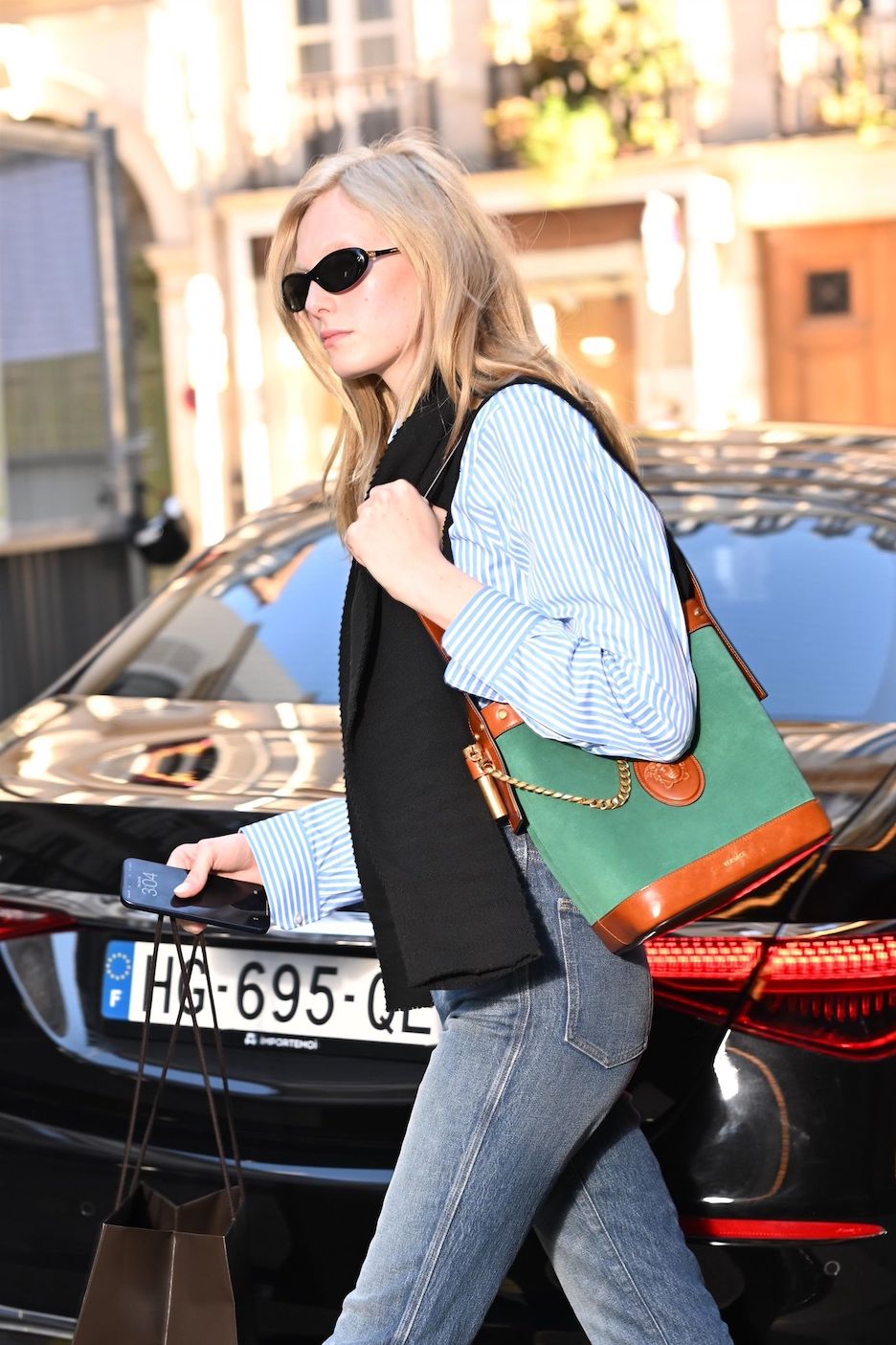
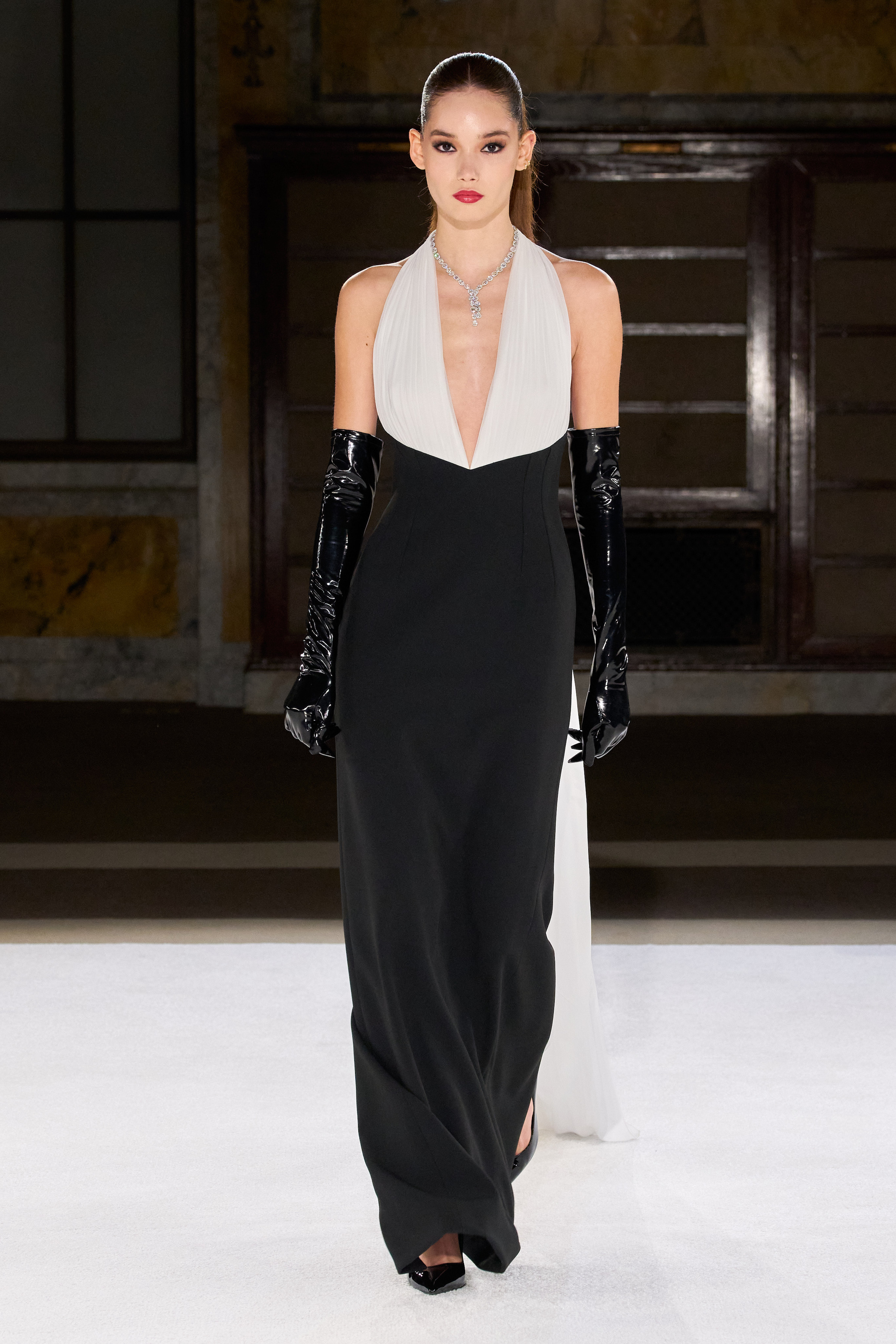
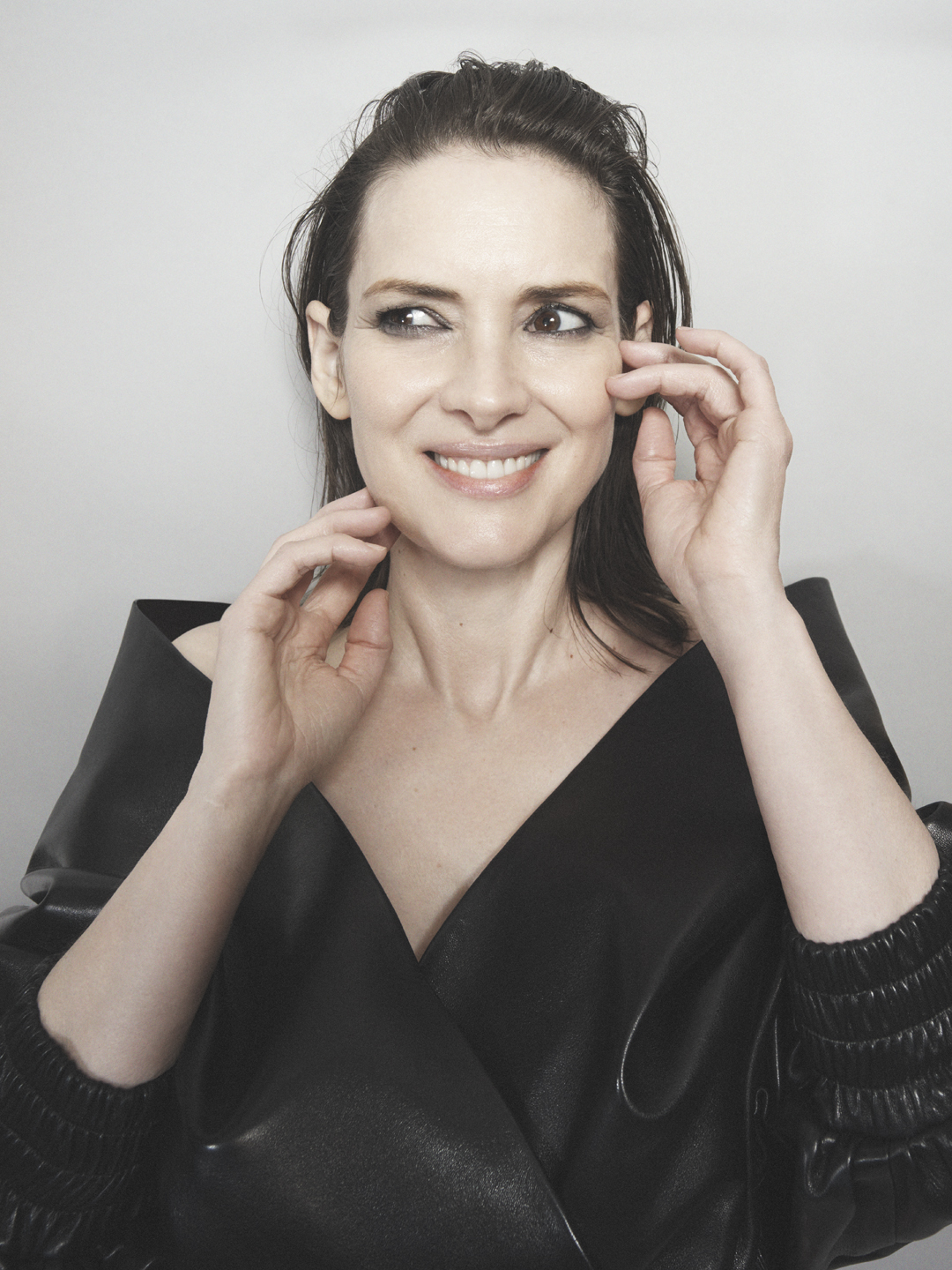
.jpg)
